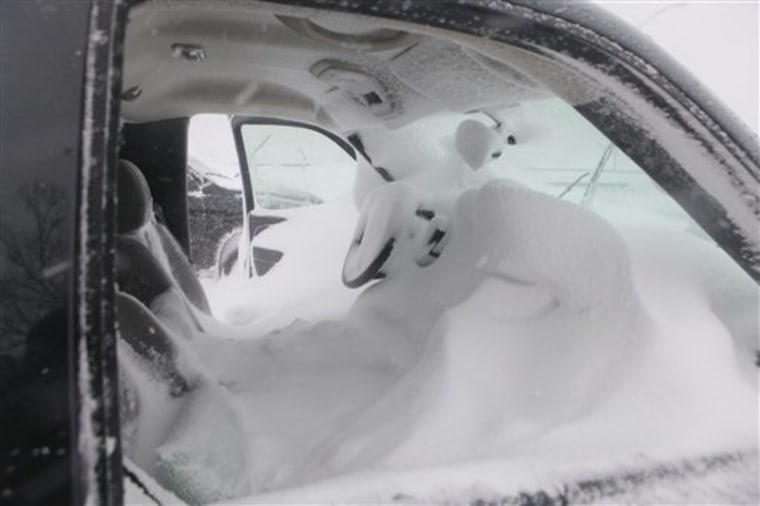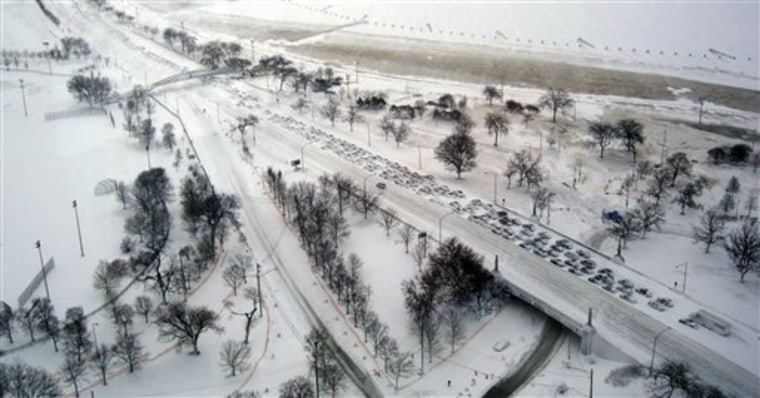Lindsey Wilson was on Lake Shore Drive, but she couldn't tell where. It was dark, and the snow swirling around the stranded bus made it impossible to see anything but the closest cars.
There was talk among her fellow commuters of 25-foot waves washing up from Lake Michigan and about when the bus might get going, but nobody knew anything — not the driver, not the emergency operators passengers were calling, and not the shivering motorists climbing aboard to keep warm after firefighters pulled them from their cars.
When a group of passengers decided enough was enough and started to walk, she joined them.
"I got 100 feet, everything was an orange hue, there was snow in my face, I couldn't see anything, I turned around and couldn't see the bus and I thought I was going to die," she said Wednesday morning.
Wilson was among hundreds of people in at least 1,500 vehicles who found themselves trapped on Chicago's most famous stretch of road for as long as 12 hours Tuesday night and Wednesday morning during one of the worst snow storms in the city's history.
The situation was among the worst impacts from the winter storm that carved a frigid path along a 2,100-mile stretch across the eastern U.S.
Accidents involving a Chicago Transit Authority bus and other cars stopped traffic on the drive's northbound lanes by early Tuesday evening.
In the morning light, the roadway looked like rush hour had been stopped in time.
"It was like, insane," one of the motorists, commuter Frank Ercole, told WLS-TV, early Wednesday. "No one knows anything. Everything's frozen."
Three lanes of cars cluttered the road with snow reaching as high as the windshields. Some cars were almost completely buried. Bulldozers worked to clear the snow from around the cars, then tow trucks plucked them out of snow drifts one by one.
The stranded vehicles were the worst breakdown in Chicago's handling of the storm.
Some motorists came away angry, frustrated and puzzled at why the city didn't close the crucial thoroughfare earlier, or why officials didn't anticipate that a bus accident could clog it up like a cork in a bottle.
"In 31 years with the city, I haven't experienced anything like we did at Lake Shore Drive," said Raymond Orozco, Daley's chief of staff.
Orozco said more than 130 firefighters, some on snowmobiles, and 100 police officers were sent to the road. As they sat and waited, the stranded motorists gratefully gobbled down granola bars and drank coffee and Gatorade, brought to them by Good Samaritans who climbed fences and railings to deliver them.
For hour after hour, the passengers in Wilson's bus waited. As lightning crackled, and wind gusts of up to 70 mph whipped up the snow and buried vehicles before their eyes, they huddled in their cars and on buses.
With word spreading that one or more buses had jackknifed ahead of them and sealed the drive, they tried to make a break for it. Fearing that they would be swallowed by the snowdrifts that by morning had climbed to the tops of vehicles, some turned around.
"I thought if I fall over, what would happen if I got buried under a pile of snow?" said Wilson, who made it back to her bus as much by feel as sight.

With so little information out there, motorists said the mood slipped from jovial to apprehensive and even to panic.
"The bus driver kept yelling, 'We are all gonna die'," said Ron Nelson, a 51-year-old salesman who was on a bus bound for a northern neighborhood where he lives. It wasn't clear if the driver was joking and "nobody thought it was funny," Nelson said at a hospital, where he was taken.
In cars, after watching their gas gauges falling, drivers tried desperately to keep their vehicles idling long enough with heaters on full blast to warm them up before turning off the ignition to keep from running out of gas.
People called family and friends on cell phones, as much to get information and ask to be rescued as relay what was going on — mostly because nobody knew.
Carolyn Pirotte, a 28-year-old nurse, just waited in her car and talked to her husband on the cell phone. He caught a ride as far as he could get, then started walking. He peered into windows until he spotted her just before midnight, six hours after her ordeal began.
He climbed in and waited with her for three hours until firefighters took them to a warming center at a nearby hospital.
As for Wilson, she wonders why she hopped on that bus just before it rolled onto Lake Shore Drive.
"I should have been smart enough not to take that route," she said.
Jenny Theroux said she was stranded from 4 p.m. Tuesday until about 4 a.m. Wednesday. Stuck just 800 feet from an exit, she repeatedly called the city for information.
"It was a very stressful experience toward the end, especially not knowing what's going on," Theroux said, after abandoning her car. "I'm just very confused as to why it all transpired this way."
The city said that all vehicles towed from the drive were taken to lots at no charge to owners, who were told to call the city's information line for details.
Jeannie Mulcahy said she called the number and didn't get much help, according to NBC Chicago.
"I spoke with a woman who basically told me she could give me no information about the location where my car was towed," Mulcahy said. "I said, 'So I pretty much have to just wander around, looking for my car until I find it?', and she said, 'That is correct.'"
Mulcahy said she left her car at around 3:45 a.m. and would not try to recover it Wednesday.
"I'm going to leave it," she said. "Last night was an ordeal that I don't want to relive."
Dozens of other motorists were out looking for their cars, NBC Chicago said, many without much luck.
